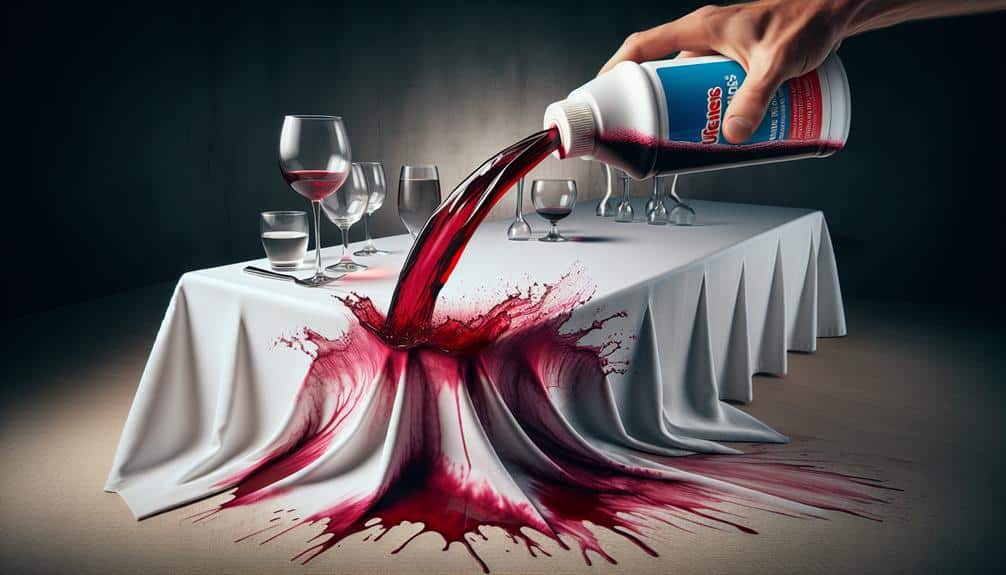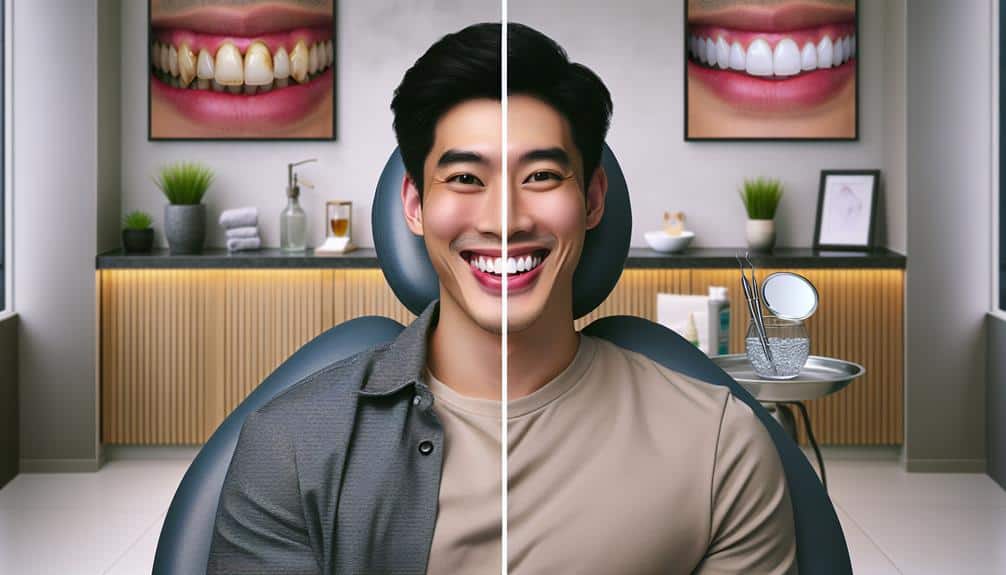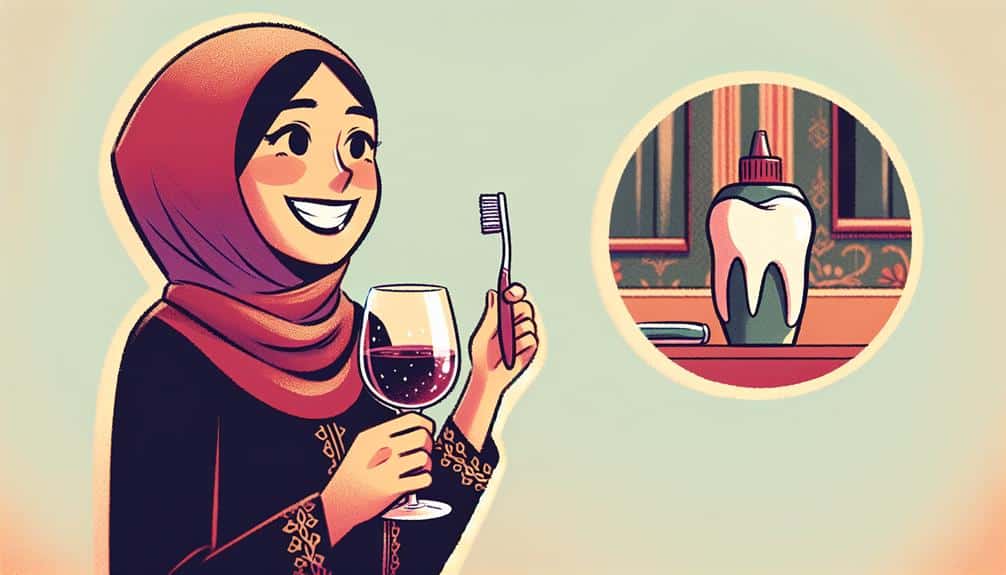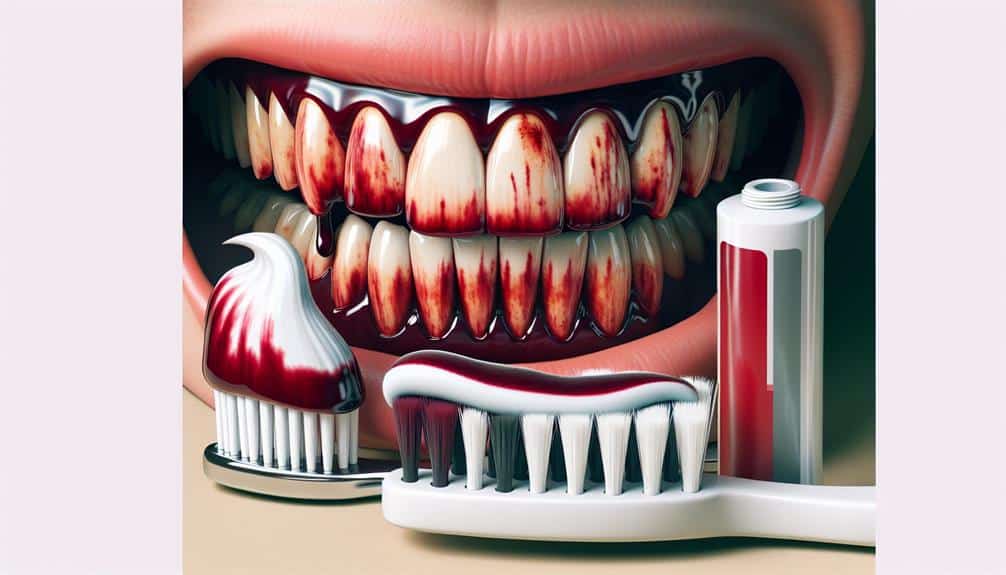Remove stubborn wine stains effectively with professional solutions like whitening treatments, in-office options, laser procedures, customized solutions, and expert services. These methods break down stains, offer precise treatment, target specific areas, and deliver noticeable results. Restore your teeth efficiently to their natural shade.
Key Points
- Professional whitening treatments effectively break down wine stains with high-concentration bleaching agents.
- In-office whitening options provide a single-visit solution using stronger whitening agents for stubborn wine stains.
- Laser whitening procedures target and remove wine stains precisely with accelerated bleaching technology.
- Customized whitening solutions tailor the treatment to individual needs for precise and effective wine stain removal.
- Expert whitening services offer personalized consultations and cutting-edge techniques for efficient wine stain removal.
Professional Whitening Treatments
Consider scheduling an appointment with a dentist for professional whitening treatments to effectively remove wine stains from your teeth. Stain removal techniques employed by professionals often use bleaching agents to break down and eliminate stubborn wine stains. These treatments are considered one of the most efficient ways to restore your teeth to their natural, white shade. Professional recommendations may vary depending on the severity of the stains, but dentists typically customize the treatment to suit your specific needs.
Professional whitening treatments offer a higher concentration of whitening agents compared to over-the-counter products, ensuring a more effective removal of wine stains. Dentists have the expertise to apply these agents safely, minimizing any potential damage to your teeth or gums. Additionally, the results from professional treatments tend to be more long-lasting and noticeable than at-home remedies. By opting for professional whitening, you're investing in a reliable solution to combat wine stains and achieve a brighter, stain-free smile.
In-Office Teeth Whitening Options
To further enhance the removal of wine stains from your teeth, explore the advanced options available through in-office teeth whitening procedures. When home remedies and DIY kits fall short, in-office teeth whitening offers a professional solution to tackle stubborn stains effectively. These procedures are carried out by dental professionals who utilize stronger whitening agents than those found in at-home kits, providing more immediate and noticeable results.
In-office teeth whitening procedures typically involve applying a whitening gel to your teeth and then using a special light or laser to activate the bleaching agents. The entire process is usually completed in a single visit, making it a convenient option for those looking to rejuvenate their smile quickly.
While in-office teeth whitening can be more expensive than at-home treatments, the results are often more dramatic and longer-lasting. The expertise of dental professionals guarantees that the procedure is done safely and effectively, giving you a brighter, stain-free smile in no time.
Laser Whitening Procedures
For effective and efficient removal of tough stains, laser whitening procedures offer a high-precision solution to brightening your smile. Laser technology has revolutionized the field of cosmetic dentistry, providing a non-invasive method for removing stubborn stains caused by substances like wine.
During a laser whitening session, a specialized dental professional will target the stained areas with a concentrated beam of light, breaking down the pigmented molecules that have adhered to the tooth enamel.
This advanced technology guarantees precise stain removal without damaging the surrounding teeth or tissues. The laser energy activates the whitening agent applied to your teeth, accelerating the bleaching process for faster and more effective results. Unlike traditional whitening methods, laser procedures typically require fewer sessions to achieve noticeable improvements in tooth color.
If you're looking for a quick and efficient way to eliminate wine stains and achieve a brighter smile, laser whitening procedures are a top choice in the field of professional stain removal treatments.
Customized Whitening Solutions
When seeking effective solutions for brightening your teeth, tailored whitening treatments customized to your specific needs and preferences can provide ideal results. These individualized approaches offer a targeted whitening experience, addressing your unique concerns and goals.
Here are three emotional aspects to ponder when exploring personalized whitening solutions:
- Personalized Experience: Embrace the feeling of exclusivity as you undergo a whitening treatment designed specifically for you.
- Tailored Results: Experience the satisfaction of achieving the precise level of whitening you desire through a personalized solution.
- Self-Care Empowerment: Feel empowered by taking charge of your dental care with a customized whitening regimen.
While at-home remedies and DIY kits offer convenience, natural solutions and homemade mixtures may lack the customization needed for ideal whitening results. By opting for a customized whitening solution, you can elevate your whitening experience to a level that resonates with your individuality and aspirations.
Expert Whitening Services
Enhance your smile with the professional touch of expert whitening services tailored to your unique dental needs and goals. Expert consultation is the cornerstone of these services, ensuring that the whitening treatment aligns with your specific requirements. Through in-depth discussions and assessments, dental professionals can recommend the most suitable whitening approach for you.
Advanced technology plays a pivotal role in modern whitening services, offering efficient and effective solutions. Utilizing cutting-edge equipment and techniques, expert whitening services can deliver noticeable results in a shorter timeframe. These technological advancements not only enhance the whitening process but also contribute to minimizing potential sensitivity or discomfort during treatment.
Frequently Asked Questions
Can Wine Stain Removal Treatments Also Help With Other Types of Stains on Teeth?
Tackling teeth discoloration requires tailored treatments. Wine stain removal methods may not directly address other types of tooth stains. Always prioritize dental hygiene to prevent and address diverse discoloration issues effectively. Seek professional advice for lasting solutions.
Are There Any Potential Side Effects or Risks Associated With Professional Whitening Treatments for Wine Stains?
When considering professional whitening treatments for wine stains, it's important to be aware of potential risks and take necessary precautions. Long term effects and maintenance of whitened teeth should also be discussed with your dentist.
How Long Does the Whitening Effect From Professional Treatments Typically Last for Wine Stains?
Maintaining the whitening effect from professional treatments for wine stains depends on your aftercare. With proper maintenance tips like avoiding staining foods and drinks, scheduling touch-up treatments as needed, you can enjoy long-term effectiveness. Consistency is key.
Are There Any Specific Aftercare Instructions or Products Recommended for Maintaining Results After Wine Stain Removal?
To maintain results after wine stain removal, follow preventive measures like using coasters and immediate blotting. Long term care involves regular cleaning and treating spills promptly. Home remedies like vinegar or baking soda can help tackle fresh stains effectively.
Can Professional Whitening Treatments for Wine Stains Be Combined With Other Cosmetic Dental Procedures for Enhanced Results?
When considering cosmetic enhancements, combining professional whitening treatments for wine stains with other procedures can enhance effectiveness and durability. Consult your dentist to explore the best combination treatments for achieving peak results.



